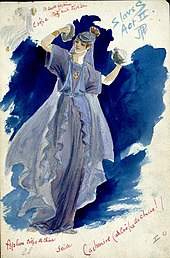Hugo Felix
This article needs additional citations for verification. (December 2018) |

Hugo Victor Felix (19 November 1866 – 25 August 1934), born Felix Hugo Hayman, was an Austrian composer of operettas and musicals born in Budapest, Austrian Empire.[1]
Felix's parents were and Hungarian–Austrian merchant, Mori[t]z Hayman (died 1896) and a Slovakian–Austrian mother, Eugenie Bachrich (died 1908). He was educated in Vienna, graduated from Vienna University with a Doctorate in Science, but decided to pursue music instead of chemistry.[1]
His first operetta was Die Kätzchen, first produced in Lemberg in 1890 and in Vienna in 1892. His other works included Husarenblut (1894, Vienna), Rhodope (1900, Vienna and Berlin), Madame Sherry (1902, Berlin – his biggest success) and The Merveilleuses (1906, London). As music director of musical director of the Carltheater in Vienna from the late 1890s to 1906, he imported several British works to Vienna, adapting both librettos and scores. He also contributed interpolated numbers to several musical comedies[1]
Felix later went to the US where Madame Sherry met with success, in 1912, and composed several more shows. He remained in the US for the remainder of his life and died in Los Angeles, California, aged sixty-seven.

References
[edit]- ^ a b c Gänzl, Kurt. "Felix the composer", Kurt of Gerolstein, 19 December 2018
- ^ Note: In his extensive list of works by Felix, Gänzl does not list Schiavo di Corinto. However, the title character of Rhodope (1900) is described as a slave.
Further reading
[edit]- D. Taylor & R. Kerr (eds.), The Biographical Dictionary of Musicians, New York (1940)
External links
[edit] Media related to Hugo Felix at Wikimedia Commons
Media related to Hugo Felix at Wikimedia Commons- Libretto of Rodomonte, Internet Archive
- Free scores by Hugo Felix at the International Music Score Library Project (IMSLP)
